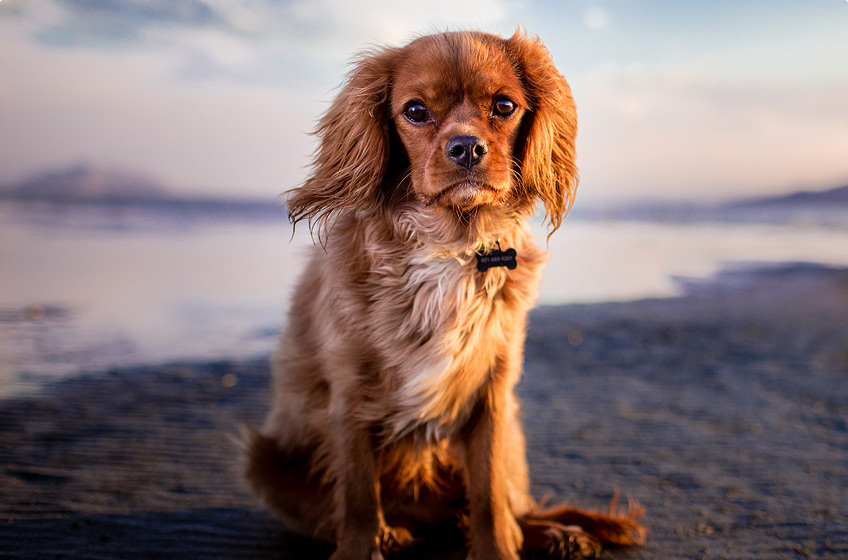ACUTE DIARRHEA IN DOGS AND CATS
Various viruses have been associated with acute diarrhea in dogs and cats. It is more common in younger animals and is more likely to resolve on its own. It is a fairly common problem, especially in dogs with dietary indiscretion.
It is an abrupt or recent onset of abnormally increased fecal water and/or solid content.
Caused by imbalance in the absorptive, secretory, and/or motility actions of the intestines.
Mechanisms of diarrhea:
Osmotic – excess molecules in the intestinal lumen draw in water, overwhelming the intestinal absorptive capacity (e.g., diet changes, malabsorption, or overeating).
Secretory – stimulation of small intestinal secretion that overwhelms the intestinal absorptive capacity (e.g., toxins). Stimulation of the parasympathetic nervous system or exposure to a variety of secretagogues can increase intestinal secretion.
Exudative/permeability – leakage of tissue fluid, serum proteins, blood, or mucus from sites of infiltration or ulceration.
Dysmotility – hypomotility (ileus) is more common than hypermotility. Hypermotility can be primary (irritable bowel syndrome) or secondary (obstruction, malabsorption leading to intestinal distention).
Mixed.
Acute diarrhea is usually self-limiting and is often an isolated episode. Most animals with acute diarrhea are not affected systemically unless the animal has acute hemorrhagic diarrhea syndrome that can cause severe dehydration and hypovolemic shock.
Sometimes an acute or peracute severe disease, more common in dogs than cats (e.g., Parvovirus, Clostridium perfringens-associated acute hemorrhagic diarrheal syndrome).
Signs of more severe illness (e.g. Concurrent vomiting, abdominal pain, hematochezia, hemoptysis, severe dehydration, or lethargy) should prompt more aggressive diagnostic and therapeutic measures.
CAUSES
Systemic illness may also result in diarrhea as a secondary event.
Dietary indiscretion—ingestion of garbage, non-food material, or spoiled food.
Dietary changes—abrupt changes in amount or type of foodstuffs.
Dietary intolerance— malassimilation of food, dietary hypersensitivity.
Metabolic diseases—hypoadrenocorticism, liver disease, renal disease, and pancreatic disease can cause acute or chronic diarrhea.
Obstruction—foreign bodies, intussusception, or intestinal/mesenteric volvulus.
Idiopathic—hemorrhagic gastroenteritis.
Viral—parvovirus, coronavirus, rotavirus, canine distemper virus.
Bacterial—Salmonella, Campylobacter, Clostridium spp., Escherichia coli, etc.
Parasitic—verminous (hookworms, ascarids, whipworms, and cestodes) or protozoal (Giardia, coccidia, Tritrichomonas and Entamoeba).
Rickettsial—Salmon poisoning (Neorickettsia).
Fungal—histoplasmosis.
Drugs and toxins—heavy metals (e.g., lead), organophosphates, nonsteroidal anti-inflammatories, steroids, antimicrobials, antineoplastic agents, etc.
NURSING CARE
Fluid therapy and correction of electrolyte imbalances is the mainstay of treatment in most cases.
Can give crystalloid fluid therapy (PO, SC or IV) as required.
Aim to return the patient to proper hydration status (over 12–24 hours) and replace ongoing losses.
Severe volume depletion can occur with acute diarrhea; aggressive fluid therapy may be necessary.
Use potassium supplementation (potassium chloride 20–40 mEq/L) in most patients, but not during shock fluid therapy. Hypokalemia can worsen ileus.
ACTIVITY
Animals should have limited activity until the diarrhea has stopped.
Limiting exposure to garbage, foods other than the patient’s normal diet, and potential foreign bodies.
Proper puppy and kitten vaccination and deworming schedules.
APPROPRIATE HEALTH CARE
Depends largely on the severity of illness; patients with mild illness can often be handled as outpatients with symptomatic therapy; patients with more-severe illness or that fail to respond to therapy should be treated more aggressively.
Young dogs and cats present for diarrhea from dietary indiscretion, intussusception, foreign bodies, and infectious causes more often than older patients.
Patients with obstructions may require surgery to evaluate the intestine and remove the foreign objects.
Most cases of acute diarrhea resolve spontaneously without treatment or with minimal treatment.
You should seek help from your veterinarian so they can provide urgent care and treatment for your pet.

